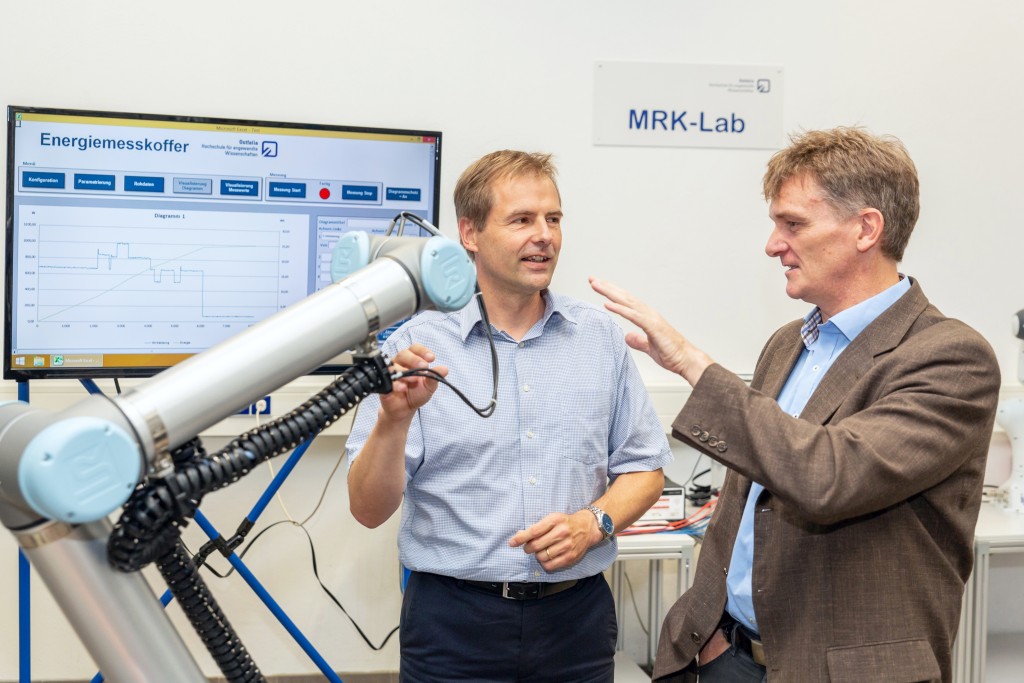This objective is one of the major challenges facing our world: Energy supply and consumption
should be more climate-friendly. Sustainability and environmental compatibility play an important
role in the research area Renewable Energies and Resource Efficiency at Ostfalia. In this
interview, the Professors Holger Brüggemann and Lars Kühl talk about the projects they are working
on and who benefits from them. And they explain why the research area enriches their work.
Professor Brüggemann, Professor Kühl, how much energy can companies save in production?
Holger Brüggemann: In our projects we have found that companies can reduce their consumption by
up to 30 percent. In Lower Saxony the areas of industry, trade, commerce and services account for
more than 40 percent of the total energy consumption. This shows how great the potential is that we
have not exploited yet.
Why is it important that we use energy more economically?
Holger Brüggemann: We have set ourselves high climate protection goals. The master plan for the
greater Brunswick area provides that we want to reduce energy consumption by half until the year
2050 and greenhouse gas emissions by 95 percent. There are similar plans for Lower Saxony and
Germany-wide. In order to achieve these goals, there are basically only two ways. First, we need
more renewable energy sources. And secondly, we have to increase energy efficiency significantly –
and that is precisely what I work on in the production environment.
Lars Kühl: I am working on the use of renewable energies in buildings – the supply of heating,
cooling and electricity. Geothermal and solar thermal systems, heat pumps and photovoltaics: these
are just a few of the headings for the large range of topics that we cover with our research
projects. And we also include these topics in teaching: we pass the findings from our projects on
to the students. Again and again, lectures take place on site in businesses and buildings. With
ongoing processes, students can follow optimisation measures – so to speak live and in colour. This
close proximity of research and teaching also makes our projects so exciting.
Why don’t more companies concern themselves with renewable energies and energy efficiency?
Holger Brüggemann: Many underestimate the opportunities to save energy. They know that
compressed air tools are not particularly efficient and leaks are a waste of resources. But they
are surprised to hear that exchanging a pneumatic screwdriver for an electric screwdriver uses 90
percent less energy. Many small and medium-sized companies are also working to capacity already.
They often lack the time to address this subject.
And this is where you come in?
Lars Kühl: Yes, it is also up to us to inform them about the potential savings and how to use
them. We visit plants, offices and residential buildings, equip them with measurement technology
and record the consumption of electricity, heat and cold. Then we explain how renewable energies
and efficiency measures can improve the energy consumption figures. We also develop concepts for
the energy supply of entire buildings. The new construction of the Oeding printing plant in
Brunswick is an energy-plus building generating its own energy. Ostfalia made a significant
contribution to the planning of the building.
What else have you worked on?
Holger Brüggemann: The expansion of the Lower Saxony “learning factory” for resource efficiency
at Ostfalia (NiFaR). This project gave rise to a non-profit organisation many partners are actively
involved in and many employees from companies have been trained in. In this way we have shown many
companies new ways and means to improve energy efficiency. In the field of robotics, we have worked
with Volkswagen AG to determine which influences affect energy consumption. If you change the robot’
s programming, you can save up to 40 percent of the energy.
Who is involved in your research area?
Lars Kühl: Our research area involves first and foremost the Ostfalia Faculties of Mechanical
Engineering, Supply Engineering as well as Automotive Engineering and Electrical Engineering. The
reason is that electromobility is an important issue: We can integrate storage capacities from
vehicles into the energy supply of buildings. We are also well networked outside of Ostfalia: via
the contact with other universities, industrial enterprises, planning offices as well as
residential property developers and municipalities we can integrate issues such as building
construction and architecture, control and measurement engineering. Thus we work according to the
state of the art in real projects and are oriented towards the needs of the users.
Holger Brüggemann: It helps us that the topics digitisation and Industry 4.0 play a major role
in businesses. Whoever digitalises production also quickly sees substantial progress after only a
short time. Our research area benefits from the fact that Ostfalia has positioned itself quite
strongly in digitisation.
Lars Kühl: It is important that there is an interface to the social scientists. This way we
examine how the optimisation measures and the use of modern technologies can gain the necessary
acceptance by the users.
Why does the research area enrich your work?
Holger Brüggemann: Because I can contribute to ensuring that we achieve our climate protection
goals. And because investments in the energy efficiency of machines and plants generally lead to
increased productivity. By means of declining energy consumption we can also improve the
competitiveness of companies. In my view, this is a very sensible task …
Lars Kühl: …especially since we do not just implement the energy-saving measures. But also
convey the numerous possibilities offered by renewable energy and energy efficiency to our students
in teaching. Like this, we ensure that our research has a sustainable impact.


